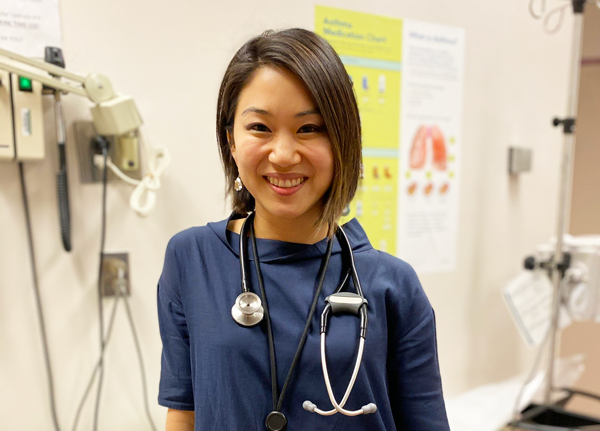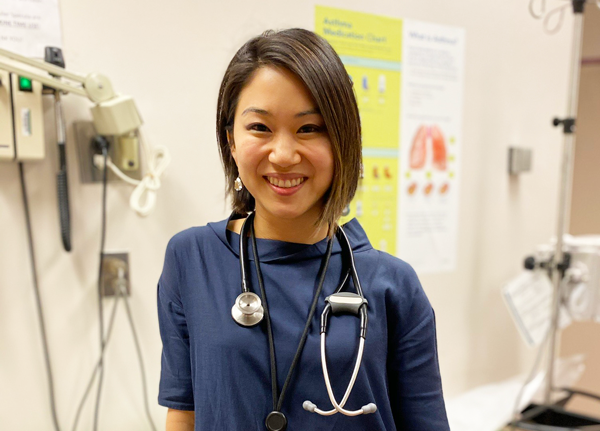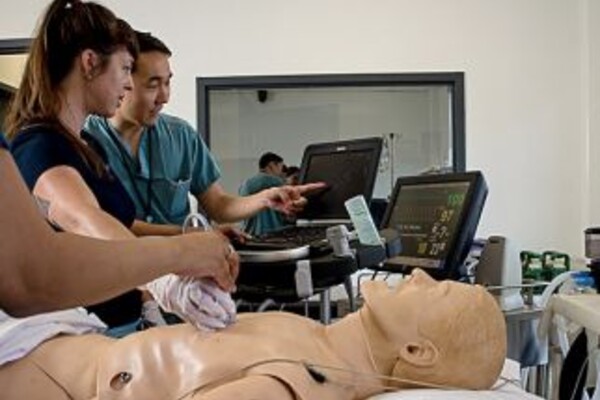Faces of U of T Medicine: Dr. Christine Song

Brianne Tulk
 Dr. Christine Song sees a wide range of conditions in her clinic at St. Michael’s Hospital, from common allergies and hives to rare immune disorders. An immunology and allergy specialist, Dr. Song’s own area of expertise is drug allergies and looking at ways to optimize patient care by ensuring that appropriate medications can be used safely.
Dr. Christine Song sees a wide range of conditions in her clinic at St. Michael’s Hospital, from common allergies and hives to rare immune disorders. An immunology and allergy specialist, Dr. Song’s own area of expertise is drug allergies and looking at ways to optimize patient care by ensuring that appropriate medications can be used safely.
Penicillin is a big one, she explains, saying that more than 90 per cent of people who are labelled as 'penicillin allergic' are actually not.
"It can happen if someone took penicillin at one point in their life, got a rash and were told to never take penicillin ever again because it could be life-threatening. This happens all the time," Dr. Song explains.
"While some can certainly have life-threatening reactions if they take the antibiotic again, many may have been misdiagnosed or have lost the allergy over time."
This can have big impacts because a 'penicillin allergy' label can have numerous adverse health outcomes, such as longer hospital stays, increased risk of developing resistance to other antimicrobial drugs, other infectious complications, and even increased risk of death for certain infections.
Dr. Song’s other areas of interest lie in medical education. Inspired by role models in medical school and residency, Dr. Song is now a Clinician Teacher, the Program Director for the Department of Medicine’s Division of Clinical Immunology and Allergy residency program, and teaches the Immunology Foundations course to first-year medical school students.
A leader in a division with few full-time faculty members, Dr. Song talks about teaching and education in one of the smallest divisions in the Department of Medicine.
Can you tell me a little about yourself?
I'm a Clinician Teacher in the Division of Immunology and Allergy. Ever since I was in medical school, I really wanted to give back in some way to medical education. I always really loved medical school and training, and I always saw myself one day being in that teacher role. I was never that person who could just hear something once in lecture and understand it or who could cram for an exam the night before. As someone who really had to wrestle with the material, I wanted to go into teaching to help break down some of these concepts for other learners. I was also really interested in the learner climate and have always wanted to contribute to making the medical school and residency culture safe and inclusive. Outside of my roles in the hospital and university, together with my husband I am also the parent of two very curious, kind and energetic boys.
What was it about the field of immunology and allergy that interested you?
In medicine, you often don't know what you're going to like until you actually experience it. When I did a rotation in immunology and allergy, I realized that I really looked forward to my day in clinic or the hospital. Upon further reflection, I realized I liked a lot of the rare diseases that we saw, but I also liked assessing and managing really common conditions, because we have effective management options to really impact the quality of life for our patients. I liked that I had to apply a lot of the basic science knowledge that I had acquired in undergraduate and medical school in the management of patients with these allergic and immunologic presentations. And I also felt that it was intriguing because there was still so much that was unknown and it was really an evolving field. Another big part of it was that every immunologist and allergist I had ever worked with was really happy and had a high degree of job satisfaction, and I think that counts for something too.
Has that job satisfaction translated into your own work?
Oh, absolutely. I really can’t imagine choosing any other career.
The Division of Clinical Immunology and Allergy is a small division. What are some of the challenges that poses?
As a Program Director, I would love to see more faculty in the division who would be able to help teach and mentor our trainees. When we're so few in number that can be a challenge. It would be nice to see more allergists and immunologists throughout the different hospital sites as there really is a huge need, with respect to patient care. There is a lot of potential for more research and collaborations, and I would love to see our division here at U of T grow in the near future.
But, being part of such a small division is also really nice because we're like a family and we all really get along. Each member is very dedicated to the division and the training program. I would consider every member of our division to be not only highly skilled in their respective fields, but also incredibly thoughtful and collegial.
As a Clinician Teacher, what approach do you bring to teaching and education?
One thing that I've come to learn is that the approach to teaching varies vastly depending who your learner is. With medical students, the most important thing is ensuring that you teach them the right content (and not too much) and make it relevant for them, recognizing that they have not yet had any clinical exposure. You also have to remember that they are still undifferentiated in where they want to go with their careers, so you have to keep in mind that they just need the foundations, like a scaffold that they can add to as they go on in their training. I still struggle with knowing what the right amount of content is. With the residents, there’s a lot of role-modeling and directed feedback, because they are a lot closer to finishing their training and going out into practice. Because there is often the opportunity to work one-on-one with residents in the clinical setting, my approach even with individual residents can vary depending on their needs and personal learning goals.
My approach to all groups is very much that you have to be respectful and approachable. That's one thing that I remember from training. Thinking of some of my favourite instructors, in addition to being really knowledgeable and being able to break down information in a way that made sense, they were all just kind people.
What might surprise people about the Clinician Teacher job description?
This might seem simple, but when you're a Clinician Teacher you simply have to love teaching. You really have to feel like you're doing it for the intrinsic value of making a positive impact on future generations of physicians, because there are times where it can be really hard, humbling, and aspects of the role take time away from other responsibilities, both work and home-related. While that might seem obvious to others, I did not anticipate the impact of that until I was immersed in the role.
The role is highly gratifying when you have the chance to create curricula, work closely with learners, and see them develop through their stages of training and beyond. Being a Clinician Teacher at U of T, you are also part of an incredible community within the Department of Medicine. And even reflecting during the challenging times in this role have allowed me to grow and appreciate not only the privilege I have in my career, but also to better appreciate my family and others in my life.



